|
|
|
Sort Order |
|
|
|
Items / Page
|
|
|
|
|
|
|
| Srl | Item |
| 1 |
ID:
189992
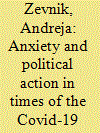

|
|
|
|
|
| Summary/Abstract |
Since the beginning of the global Covid-19 pandemic in the spring of 2020 countries across the world have implemented various measures to contain the virus. They have restricted public gatherings, mobility and congregation of people at homes and in public places. These restrictions however did not stop another chain of events – the global Black Lives Matter (BLM) protests. In the summer of 2020 people across the globe mobilised to protest the police killing of George Floyd. In the UK the protest for Black Lives took place in all major cities, but they also continued weekly in smaller communities by ‘taking the knee’. What interests me in this contribution is how anxieties experienced during the global pandemic contributed to the mobilisation of large-scale political actions for racial justice and how might we consider anxiety as a mobilising force in political space in times of global pandemic in particular in the context of anti-racist protests such as BLM. This forum contribution opens by considering how global pandemic aided conditions for political action for racial justice, before discussing the role of anxiety in political mobilising. Here I first detailed how anxiety is understood in Lacanian psychoanalysis before considering what it tells us about the BLM protests for racial justice and specifically the removal of the Colston statue during the Bristol protest on June 7 2020.
|
|
|
|
|
|
|
|
|
|
|
|
|
|
|
|
| 2 |
ID:
121028
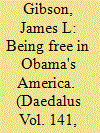

|
|
|
|
|
| Publication |
2012.
|
| Summary/Abstract |
Many studies of interracial differences in rates of political participation pay too little attention to African Americans' perceptions of whether they can freely participate in politics. Survey evidence collected over the last several decades has consistently shown that black Americans perceive much less political freedom available to them than do white Americans. The gap in perceived freedom has narrowed somewhat in recent years but remains large. Following the empowerment hypothesis of Lawrence Bobo and Franklin Gilliam, black perceptions of freedom increased with the election of Barack Obama to the American presidency. But perhaps unexpectedly, the empowerment bonus has not persisted, especially among conservative and fundamentalist blacks. Because African Americans do not perceive that their government would permit various types of political action, it is likely that substantial interracial differences exist in non-voting types of political participation, especially political action directed against governmental authority.
|
|
|
|
|
|
|
|
|
|
|
|
|
|
|
|
| 3 |
ID:
143058
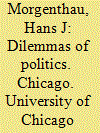

|
|
|
|
|
| Publication |
Chicago, University of Chicago Press, 1958.
|
| Description |
389p.hbk
|
| Contents |
B
|
|
|
|
|
|
|
|
|
|
|
|
Copies: C:1/I:0,R:0,Q:0
Circulation
| Accession# | Call# | Current Location | Status | Policy | Location |
| 058436 | 320/MOR 058436 | Main | On Shelf | General | |
|
|
|
|
| 4 |
ID:
133299
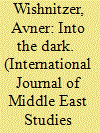

|
|
|
|
|
| Publication |
2014.
|
| Summary/Abstract |
This article analyzes different traditions of nocturnal conviviality in 18th-century Istanbul and demonstrates their importance for social, political, and cultural life. The main argument is that the palace used the night to demonstrate its power in spectacles of light and to cultivate personal relations within the elite, both of which were crucial for a patrimonial government based on face-to-face interaction. Yet, it was exactly the reliance on such interaction that marked the limits of the palace's hold of the night. With the neighborhood gaze blinded by darkness, communal policing lost much of its effectiveness, leaving nocturnal social life largely concealed from the eyes of the authorities. Nighttime therefore offered opportunities for illicit modes of socialization and, at times, for subversive political action.
|
|
|
|
|
|
|
|
|
|
|
|
|
|
|
|
| 5 |
ID:
127830
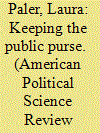

|
|
|
|
|
| Publication |
2013.
|
| Summary/Abstract |
It is widely believed that rents from windfall revenue undermine accountability. An enduring explanation is that windfalls free leaders from the need to tax, producing a quiescent population. Yet, there is little direct evidence of how windfalls and taxes affect citizen political action. I use novel revenue and information experiments to examine whether and why windfalls (compared to taxes) affect how citizens participate in politics. The experiments were embedded in a public awareness campaign conducted with 1,863 citizens in Indonesia. The results-from an original survey and postcard campaign-indicate that the tax treatment increased monitoring and anti-incumbent political action. Yet, when given spending information, citizens in the windfall treatment cared just as much about misused revenue as those in the tax treatment. The findings have important implications for understanding not only how revenue affects citizen political behavior but also how people acquire and process information on government spending
|
|
|
|
|
|
|
|
|
|
|
|
|
|
|
|
| 6 |
ID:
109972


|
|
|
|
|
| Publication |
2011.
|
| Summary/Abstract |
This lecture addresses the connection between the production in the present of particular memories of the past and the ability to frame present-day conflicts in ways that render certain possibilities legitimate while excluding others. Through the ethnographic material I have gathered during my career I will show how different projects of the future (personal and collective) appeal to memories of conflict that link responsibilities and generations at different scales. Taking as my object of observation the transformations in economic relations in a heavy industrial region of northwestern Spain I will trace the connections between the languages and practices of contention, the reconfigured structures of production and governance, and the production of diverse memories (and silences) of conflict. Diverse memories produce struggles framed in class terms, or struggles framed in terms of corporatist interests, or in terms of contingently defined social claims. Through this often ambivalent delimitation of conflicts between past and present, the field of possible futures gets configured and with it the spectrum of possible political action.
|
|
|
|
|
|
|
|
|
|
|
|
|
|
|
|
| 7 |
ID:
175583


|
|
|
|
|
| Summary/Abstract |
Why would individuals engage in or support contentious politics? This question is challenging to answer with observational data where causal factors are correlated and difficult to measure. Using a survey-embedded experiment, we focus on three situational factors: grievances, risk, and identity. We also explore how individual differences in sociopolitical orientations—social dominance orientation (SDO) and right-wing authoritarianism (RWA)—impact action. Grievances influence engagement in and support for protests. Risk influences engagement in protest, but not support for it. Regardless of condition, SDO and RWA help explain why some people engage in protest while others do not, particularly within the same context.
|
|
|
|
|
|
|
|
|
|
|
|
|
|
|
|
| 8 |
ID:
085110
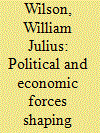

|
|
|
|
|
| Publication |
2008.
|
| Summary/Abstract |
William Julius Wilson examines the racial and nonracial political forces as well as the impersonal economic forces that have adversely impacted inner-city areas. He suggests a new policy agenda that reflects an awareness and appreciation of the effects of systemic changes on poor urban neighborhoods
|
|
|
|
|
|
|
|
|
|
|
|
|
|
|
|
| 9 |
ID:
131053


|
|
|
|
|
| Publication |
2014.
|
| Summary/Abstract |
Few systematic studies of US uses of force treat the inherent attributes of presidents as the key causal factors; nonetheless, the fact that individual leaders matter is evident to the public, the media, and foreign policymakers in other countries. This study advances the development of First Image explanations of conflict by empirically investigating the relationship between presidential personality and the variation surrounding foreign policy decision making. The importance of this type of variance has been understudied in international relations, and the consistency of leaders' policy decisions has important strategic implications for interstate conflict. Relying on Big Five measures of US presidents' personality traits, we find that leaders who have a high tendency toward Excitement Seeking are more likely to use force to carry out their foreign policy objectives, while those who are more Open to Action exhibit a greater variance around their foreign policy decision making. In sum, the personality traits of individual leaders influence not only the choices they make, but the consistency of their choices, which has important consequences for US foreign policy.
|
|
|
|
|
|
|
|
|
|
|
|
|
|
|
|
| 10 |
ID:
086768


|
|
|
|
|
| Publication |
2009.
|
| Summary/Abstract |
Since Tocqueville's seminal writings, voluntary associations have been proclaimed to be schools of democracy. According to this claim, which regained popularity during the 1990s, involvement in voluntary associations stimulates political action. By participating in these associations, members are socialised to become politically active. Supposedly, having face-to-face contact with other members induces civic mindedness - the propensity to think and care more about the wider world. Participating in shared activities, organising meetings and events, and cooperating with other members are claimed to induce civic skills and political efficacy. Over the years, many authors have elaborated on these ideas. This article offers a systematic examination of the neo-Tocquevillian approach, putting the theoretical ideas to an empirical test. It offers a critical overview of the literature on the beneficial role of voluntary associations and dissects it into five testable claims. Subsequently, these claims are tested by cross-sectional, hierarchical analyses of 17 European countries. The authors conclude that the neo-Tocquevillian theory faces serious lack of empirical support. In line with the expectations, they find a strong, positive correlation between associational involvement and political action. Moreover, this correlation is positive in all countries under study. However, more informative hypotheses on this correlation are falsified. First, the correlation is stronger for interest and activist organisations than for leisure organisations. Second, passive (or 'checkbook') members show much higher levels of political action than non-involved, whereas the additional effects of active participation are marginal. Third, the correlation between associational involvement and political action is not explained by civic skills and civic mindedness. In sum, the authors find no evidence for a direct, causal relation between associational involvement and political action. The socialisation mechanism plays a marginal role at best. Rather, this article's findings imply that selection effects account for a large part of the correlation between associational involvement and political action. The conclusion reached therefore is that voluntary associations are not the schools of democracy they are proclaimed to be, but rather pools of democracy.
|
|
|
|
|
|
|
|
|
|
|
|
|
|
|
|
| 11 |
ID:
134350


|
|
|
|
|
| Summary/Abstract |
Nearly every week there are stories of destructive fires in Kenyan secondary schools. Most of these are suspected arson cases, and the usual suspects are the schools' current students. This article provides the first analysis of the recent spate of school-based fire incidents, based on a comprehensive survey of media, government, and court reports, as well as primary data collected through interviews with students, educators, and administrators. This evidence clearly demonstrates that school-based arson is a phenomenon that spans regions in Kenya, and occurs in boys', girls', and mixed schools, private and public schools, and across school calendars. Current and former students explain this trend in terms of arson's effectiveness as a tactic in protest politics. Based on these findings, I argue that school-based arson is indicative of more than the contested conditions of education in Kenya today. The use of arson by students reflects what this generation has learned about how protest and politics work in Kenya. Students' recognition that destructive collective actions are efficacious in winning a response from authorities highlights that learning and feeds a reactionary mode of governance in which citizens' initiatives tend to be neglected until they pose direct threats to public peace and financing.
|
|
|
|
|
|
|
|
|
|
|
|
|
|
|
|
| 12 |
ID:
117060
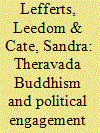

|
|
|
|
|
| Publication |
2012.
|
| Summary/Abstract |
The Thai-Lao of North East Thailand (Isan), the major ethnic group in a core area of the Red Shirt movement, have long expressed concern with the well-being of the muang - now nation-state - in which they reside. This paper explores the proposition that the moral foundations for continuing political engagement at the muang level are explicitly stated in the annual Theravada Buddhist festival, the Bun Phra Wet, celebrated in almost every Thai-Lao village. Moreover, these concerns also involve appropriate actions by the people to correct the systems in which they live.
|
|
|
|
|
|
|
|
|
|
|
|
|
|
|
|
| 13 |
ID:
131548


|
|
|
|
|
| Publication |
2014.
|
| Summary/Abstract |
Since our earliest days as a profession, regularities of politics have been described in terms of laws of political behavior (Bryce 1909), but not without controversy. Reviewing a century of efforts to identify laws of politics yields numerous offerings, including Duverger's (1954) and Michels' (1915) well-known contributions. Following the structure embodied in Newton's Laws of Motion, I propose three general laws of politics and government in America: (1) political objects in motion tend to stay in motion, (2) the relationship between a candidate and his or her political force is the product of campaign funding and personal likability or appeal to the press, and (3) for every political action, there is an equal and opposite reaction (i.e., "Craig Leonard Brians Law of Unintended Political Consequences"). Each law is illustrated and discussed using examples drawn from US politics. Finally, I note several potential research limitations of these proposed laws, as well as their possible utility in teaching introductory political science courses.
|
|
|
|
|
|
|
|
|
|
|
|
|
|
|
|
| 14 |
ID:
090674
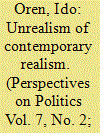

|
|
|
|
|
| Publication |
2009.
|
| Summary/Abstract |
Realist International Relations thinkers often intervene in political debates and criticize their governments' policies even as they pride themselves on theorizing politics as it "really" is. They rarely reflect on the following contradictions between their theory and their practice: if there is a "real world" impervious to political thought, why bother to try to influence it? And, is realist theory not putatively disconfirmed by the fact that realist thinkers have so often opposed existing foreign policies (e.g., the wars in Vietnam and Iraq)? I argue that these contradictions are not inherent in realism per se so much as in the commitment of contemporary realists to naturalistic methodological and epistemological postulates. I show that Hans Morgenthau and especially E. H. Carr, far from being naïve "traditionalists," have grappled with these questions in a sophisticated manner; they have adopted non-naturalistic methodological and epistemological stances that minimize the tension between realist theory and the realities of realists' public activism. I conclude with a call for contemporary realists to adjust their theory to their practice by trading the dualism underlying their approach-subject-object; science-politics; purpose-analysis-for E. H. Carr's dictum that "political thought is itself a form of political action."
|
|
|
|
|
|
|
|
|
|
|
|
|
|
|
|
|
|
|
|
|